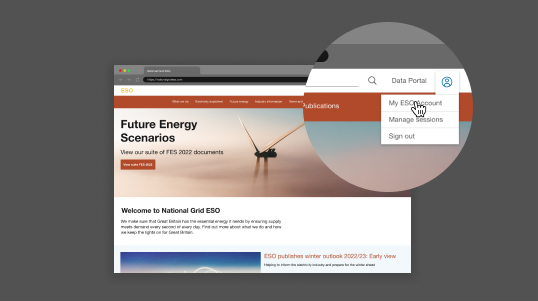We’re fundamentally reforming the connections process to make it fit for the future. We recognise the challenges around connections and the application process. As a result, we have launched our five-point plan of tactical initiatives to help improve the connections process in the short-term.
Allowing customers to leave our queue without incurring penalties for doing so. This amnesty closed in April 2023 and received over 8GW of interest – alleviating pressures within the pipeline of projects. We are currently working on the costs with Ofgem and will soon be updating contracts.
More information on the TEC amnesty
The TEC amnesty was a process run by the ESO, in partnership with Transmissions Owners (TOs), where we invited all parties with connections agreements listed on the TEC register (e.g. generation developers) to confirm whether they would be willing to terminate their agreement at minimal or no cost, or reduce their TEC.
We have been working closely with Ofgem and the three TO’s, and understand the concerns that stakeholders have raised about the connections queue and the need to implement more effective queue management arrangements. Improving queue management will deliver value to consumers by better optimising the investments required to connect customers, as well as helping deliver Government’s decarbonisation policies.
The TEC amnesty is the first phase in this process along with the queue management CUSC work group (CMP 376) restarting. With this in mind, and ahead of queue management milestones being applied within connection agreements, we ran a TEC amnesty, from September 2022 to April 2023, to allow customers to leave the queue or reduce TEC with no or little cost.
If the code modification CMP376 is approved by Ofgem, then queue management milestones will be applied to all new applications and modification applications received after Ofgem’s decision. The TEC amnesty was an opportunity for customers to leave the queue before these milestones apply.
The TEC amnesty is now closed and 8.2GW of projects applied to terminated contract.
On 22 September 2022 the ESO (in partnership with the TO’s and Ofgem) launched the first TEC (Transmission Entry Capacity) amnesty since 2013, giving customers the opportunity to terminate or reduce TEC with a reduced or no cost.
Following industry feedback, we extended the expression of interest window, from 30 November 2022 to the end of April 2023, to enable further progress in the activities listed below as well as help drive our ambition to meet net zero:
- Completion of HND1 contract update
- Further progress on the Construction and Planning Assumptions optimisation exercise
- Completion of interconnector Cap and Floor review
- CMP376: Introduction of Queue Management milestones to connections contracts
- Conclusion of latest Capacity Market Auction
This is the first step towards improving the connections process via a number of reforms as set out in our Business Plan 2 ambitions.
Overview of timescales

- September 2022 - TEC amnesty expression of interest letter released to industry
- 1 October to 30 April 2023 - TEC amnesty expression of interest window opened
- 1 May 2023 to 30 June 2023 - Review of submissions
- 31 July 2023 - Next steps confirmed and communicated with customers
How will I know if my application is successful?
We will get in touch with each customer individually to let them know the outcome for their project. Customers will then be able to choose whether or not to go ahead with the termination/reduction in TEC. Please note if the application is not successful then queue management milestones may be added to your agreement subject to the outcome of CMP376.
The TEC amnesty is the last opportunity for projects to leave the queue with no or little cost ahead of the queue management milestones coming in place following the code modification which has recently re-started.
The ESO in cooperation with the TOs have been in close communication with Ofgem on this Amnesty for a number of months and it was agreed that a letter would be produced for Ofgem that highlights the steps required in order for the TEC Amnesty to progress.
We are updating how we calculate project connection dates. This action has been completed and we are working with GB’s Transmission Owners to review and update existing contracts with these new Construction Planning Assumptions (CPAs).
Batteries and other energy storage technologies soak up energy generation when connected to the grid as well as releasing it back onto the grid. As this technology has a dual purpose, we have changed how we calculate their impact on the system.
From 27 November 2023, we will be issuing all customers who hold a live construction agreements with a completion date post-November 2025, with a notice with two options; either to have queue management milestones applied to their current completion date or submit a modified application for a new completion date where queue management milestones will be applied.
Queue management milestones will also be applied to any connection agreements sent from this date and any new application received after this date.
And finally, we will be enabling energy storage projects to connect to the grid more quickly. This will speed up connections for up to 95GW of energy storage projects in the pipeline to ensure system security, they may be instructed to reduce their output, however, only on very rare occasions.

Two-step offer
To begin rolling out the new CPA and battery modelling assumptions across GB, we need to work with Transmission Owners (TO) who will adopt different strategies to carry out a review of existing contracted connections.
From 1 March, in England and Wales, we’ll be implementing a new two-step process. This will reduce uncertainty for developers in the long-term and will apply our new background modelling and battery assumptions. In Scotland, these changes will be applied without the need to implement a new two-step process (using the current process in place today).
Transmission Reinforcement Works (TRW) review
The new methodologies to improve background Construction Planning Assumptions (CPAs) and the modelling of BESS projects over the last 12 months have been agreed by all three TOs and will be used for both existing contracted projects and new connection applications, thereby ensuring consistency across the country.
However, to implement these changes, a complete system review of the GB Transmission Reinforcement Works (TRW) for all contracted offers with a connection date post 1 January 2026 is urgently needed.
This review will rationalise the TRW required for the contracted parties and also identify any options for BESS parties to connect earlier but with interim restrictions.
We anticipate that after the review has been completed, that some contracted parties within the GB transmission system queue with connections dates could have their connection date moved forward.

Connections reform
To address these issues in the longer term, we have launched the connections reform project to address these challenges and put our customers and stakeholders at the heart of this change.

